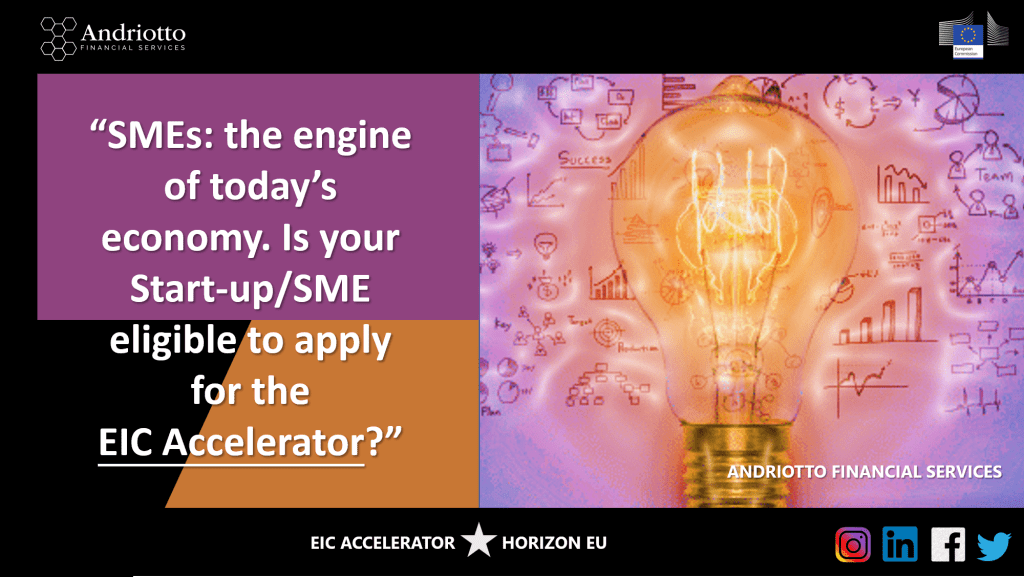This article presents the EIC Accelerator’s eligibility criteria used as cut-off point to receive funding requests from companies.
Small and medium-sized enterprises (SMEs) represent 99% of all businesses in the European Union. They are the driving disruptive mechanism for innovative solutions and a digital sustainable economy. SMEs are leading the revolution to tackle challenges like climate change, resource efficiency, and social cohesion throughout the planet.
Given their importance to Europe’s economy, SMEs are a major focus of EU policies. The European Commission aims to promote entrepreneurship and improve the business environment for SMEs. Thereby, allowing them to realize their full potential in today’s global economy.
The EIC Accelerator supports SMEs and small mid-caps through funding from € 0.5 mln to € 17.5 mln (3). Regarding the program, one must observe objective and subjective criteria to be eligible to submit a proposal.
EIC Accelerator’s eligibility criteria
1. Objective Criteria (Who can apply?)
1.1. Type of Company
This division is important to establish a clear picture of an enterprise’s economic situation and to exclude those that are not genuine SMEs. Two main factors determine whether an enterprise is an SME according to the European definition:
- Staff headcount; and
- Either turnover or balance sheet total.
These rules apply to the numbers of individual firms only. A company that is part of a larger group may need to include staff headcount/turnover/balance sheet data from that group too.
Figure 1: Definition of micro and SMEs
Additionally, SMEs and small mid-caps are eligible observing the following aspects:
- A single company classified as SME established in an EU Member State or Associated Country.
- A small mid-cap: up to 500 employees. Eligible to the investment component only (equity up to € 15 mln for commercialisation activities).
One or more natural persons or legal entities:
- Intending to establish an SME or a small mid-cap in a Member State or Associated Country by the time of contract signature.
- Intending to invest in an SME or small mid-cap (Member State or Associated Country), who may submit the proposal on behalf of that SME or small mid-cap and who have a prior agreement with the company. Contract only with the beneficiary company.
- From a third country (non-associated), intending to establish or relocate an SME to a Member State or Associated Country by the time of submitting the full application (Phase 2 Proposal). The company will have to prove effective establishment and meet the union interests.
The definition of SMEs is, therefore, extremely important to access funds and participate in EU’s funding programmes, which target these enterprises specifically. The definition of SMEs distinguishes among three distinct categories:
- Autonomous: completely independent or has one or more minority partnerships, with less than 25 % of other enterprises;
- Partner: holdings with at least 25 % but no more than 50 % of other enterprises;
- Linked enterprise: holdings exceeding the 50 % threshold participation in other enterprises.
1.2. Technology Readiness Level (TRL)
The Technology Readiness Level (TRL) is another important aspect to consider when applying for the EIC Accelerator. Specifically, the TRL provides a guide to assess the company stage of development.
Regarding the EIC, the Technology Readiness Level (TRL) requirements are:
- A company/proposal should have at least completed TRL 4 and undertaken activities to achieve TRLs 5 to 9, to be funded;
- Grant support is for development activities (TRLs 5/6 to 8); and
- Scale-up activities (TRL 9) can request investment only.
1.3. Countries
To be eligible for funding, the applicants must be established in one of the eligible countries, i.e.:
- Member States (including overseas countries and territories);
- Eligible non-EU countries: Associated countries and low- and middle-income countries(*).
(*)At the date of this publication, the associated countries were still to be confirmed. Considering the Union’s interest to retain, in principle, relations with the countries associated to Horizon 2020, most third countries associated to Horizon 2020 are expected to be associated to Horizon Europe by the time the first grant agreements under Horizon Europe are signed. In addition, other third countries may also become associated to Horizon Europe during the programme. For the purposes of the eligibility conditions, applicants established in Horizon 2020 Associated Countries or in other third countries negotiating association to Horizon Europe will be treated as entities established in an Associated Country, provided that the Horizon Europe association agreement with the third country concerned applies at the time of signature of the grant agreement. If the association agreement provides for an exclusion from the EIC Fund, legal entities from that country are only eligible to apply for the ‘grant only component of the EIC Accelerator. You can check the Horizon 2020 Associated Countries here.
2. Subjective Criterium
2.1 Type of Innovation
The European Commission is particularly looking for start-ups, SMEs and, in exceptional cases, small mid-caps:
- Seeking to scale up high impact innovations with the potential to create new markets or disrupt existing ones;
- Focused on innovations built on scientific discoveries or technological breakthroughs (‘deep tech’); and
- With innovations where significant funding is needed over a long timeframe and are too risky for private investors alone.
Do you need help to better navigate EIC Accelerator’s eligibility criteria?
Are you looking for funding opportunities? Our team of experts can help you build a reliable and consistent strategy.
Contact us for additional information and a free pre-evaluation of your project, including the eligibility criteria.



